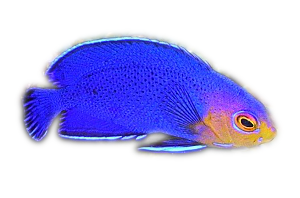
By Bob Goemans

Likely Reef Tank Suitable
Likely Fish-Only Tank Suitable
Range: Indo-West Pacific Ocean: East Africa to Hawaiian and Society Islands, south to the Great Barrier Reef.
Size: 3 inches (6 cm)
Natural Environment: Inhabits caves and crevices of lagoons, seaward reefs and drop-offs and usually found at depths between 25 – 100 feet (8 – 30 m) where it feeds on worms and crustaceans.
General Husbandry: Occasionally seen in the trade with the adult male and female having a brown body with a diagonal whitish band on the head, one central body vertical white band, and one on the aft body. There’s also a black eyespot edged in white on the rear dorsal and anal fins.
Can be maintained in reef or fish-only aquariums that should be well established, as those in this genus are constant browsers, seeking to find small benthic invertebrates to dine on. There should also be numerous caves and crevices to take shelter when needing to do so, and also explore or sleep in.
Requires peaceful tankmates, as those in this genus are quite timid and secretive. If harassed, would remain in hiding and starve to death.
Requires a meaty diet, including fortified brine shrimp, mysis, and other meaty type marine-based frozen for fresh foods, and should be fed several times daily.
Taxonomy:
Order: Perciformes
Suborder: Labroidei
Family: Labridae
Genus: Wetmorella
FYI: Highly secretive and hides a lot, in fact so much you'll probably rarely seen it in large aquariums!
Experience Level: Beginner
Temperament: Peaceful
Diet: Carnivore
Coral Safe: Yes
Fish Safe: Yes
Invertebrate Safe: With caution
Acclimation Time: 30 minutes+
Aquarium Environment: Reef or fish-only aquarium
Tankmates: Peaceful
Minimum Tank Size: 10 gallons
Temperature Range: 74 - 82°F (23 – 27°C)
Specific Gravity: 1.020 - 1.026
pH: 8.0 - 8.5
.jpg)